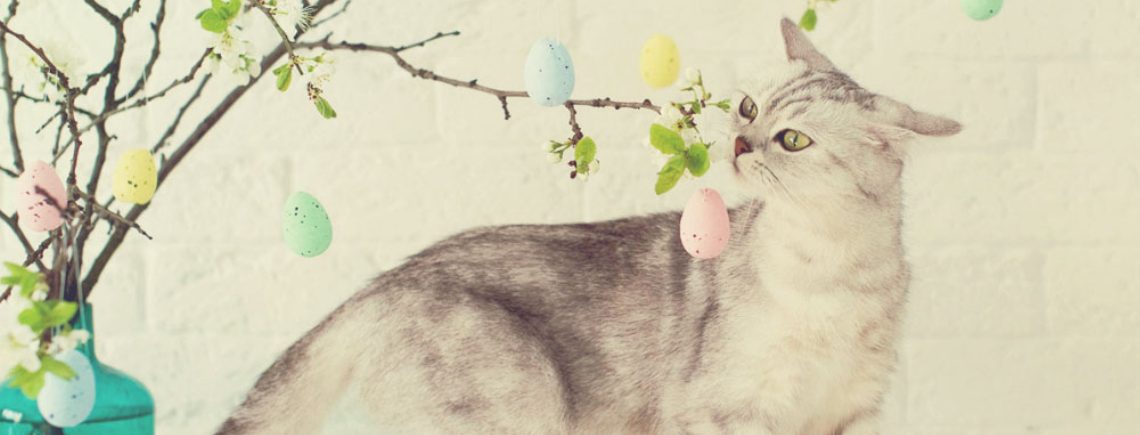5 Ways to Keep your Pet Safe This Easter
Keeping your Pet Safe this Easter
Easter is just around the corner, and with everyone stocking up on chocolate Easter eggs and yummy treats, it’s important to keep an eye on your pet and make sure they aren’t nibbling on something they shouldn’t be. Easter time can pose some hazards for your dog or cat, but with a little planning and following the correct procedures, you can ensure your beloved pet will enjoy the Easter break just as much as you do.
1. Keep Chocolate Away
Chocolate is very toxic for cats and dogs, and with the rise in chocolate treats around the house during Easter, it’s essential that you keep your curious pet away from snacking on anything that could potentially cause them harm. This means ensuring your dog or cat isn’t sneakily getting into your children’s easter egg baskets or accidentally finding some hidden chocolate eggs. It would also be a good idea to teach any young children on this too, as they may give a sneaky chocolate treat to their furry friend.
Why is chocolate bad for my pet?
Chocolate contains theobromine, a chemical that can be lethal to dogs and cats. Dark chocolate and cooking chocolate in particular contain high levels of theobromine, but it is present in milk chocolate too.
Your pet is unable to metabolise theobromine and they can become extremely unwell if they ingest a toxic amount. They may begin to show symptoms anywhere between 30 minutes and 24 hours after ingestion, but even if they aren’t showing any signs of being unwell, it is crucial they receive veterinary attention as soon as possible.
Symptoms of Chocolate poisoning in Dogs and Cats
- Vomiting and Diarrhoea
- Dehydration and excessive thirst
- Increased urination
- Panting or restlessness
- Drooling
- Lethargy
- Muscle tremors
- In severe cases, seizures and heart failure
As with any medical emergency, you should bring your pet to the vet immediately if you suspect they ate any chocolate. Your vet will be able to determine the extent of the poisoning and will provide the correct treatment. You should continue to monitor your pet in case other ill effects present themselves.

2. No Hot Cross Buns
Hot Cross Buns are another popular treat around Easter time, but they are not suitable for pets and can cause very harmful side effects if ingested. Dried fruits such as raisins and sultanas and even grapes are just as poisonous to dogs and cats as chocolate is, and cause vomiting, diarrhoea, and in severe cases, kidney failure.
Even sweets can be very harmful to your pet as many sugar-free candies contain xylitol, a sugar substitute that is very toxic to cats and dogs. Ingesting even a small amount of xylitol can cause a sudden drop in your pet’s blood sugar, resulting in seizures, possible coma or even death.
If you suspect your pet has ingested any sweets, you should immediately call your veterinarian and they can give the best course of treatment to help them.
What Treats Can I Give My Pet?
Your pet can still celebrate the Easter holidays with some delicious and suitable treats that won’t upset their tummies. For more yummy treats your dog or cat will enjoy, see our products for dogs here and our products for cats here.

3. Toxic Lilies
With flowers blooming during this season, it is important to take note that lots of plants can be poisonous to your pet, such as geraniums and azaleas. Daffodils and tulip bulbs can also be toxic so you should make sure their bulbs are buried deeply enough so your pet won’t reach them.
Lilies are very poisonous to pets, and should be completely avoided, especially if you are a cat-owner. Lilies can cause irreversible kidney failure in cats, so it is imperative that you double check your cat or dog cannot reach any of them, as even a small amount can cause serious harm. If you do suspect they ingested a poisonous flower, immediately seek veterinary help.
4. Mind the Plastic
Pets cannot absorb plastic, so bear this in mind if you plan on using plastic Easter grass in your children’s Easter egg baskets and when you open your Easter Egg boxes. The plastic can become lodged in their gastrointestinal tract and cause serious issues such as vomiting, diarrhoea, loss in appetite, lethargy and pains in the stomach.
After the kids open their baskets and easter eggs, be sure to throw the Easter grass and any plastic out, and hoover your carpet if necessary.
5. Table Scraps
We know it’s hard to resist those big, begging eyes looking up at you as you’re tucking into your dinner. However, feeding your dog or cat fatty meats such as ham and lamb can lead to abdominal and intestinal pain for your pet, as well as diarrhoea and pancreatitis. Watch out for your pet going through your leftovers too, and make sure they are out of reach once they are chucked into the bin.

